23 start with D start with D

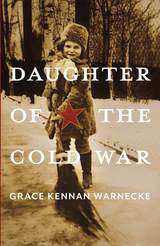
Born in Latvia, Grace lived in seven countries and spoke five languages before the age of eleven. As a child, she witnessed Hitler’s march into Prague, attended a Soviet school during World War II, and sailed the seas with her father. In a multi-faceted career, she worked as a professional photographer, television producer, and book editor and critic. Eventually, like her father, she became a Russian specialist, but of a very different kind. She accompanied Ted Kennedy and his family to Russia, escorted Joan Baez to Moscow to meet with dissident Andrei Sakharov, and hosted Josef Stalin’s daughter on the family farm after Svetlana defected to the United States. While running her own consulting company in Russia, she witnessed the breakup of the Soviet Union, and later became director of a women’s economic empowerment project in a newly independent Ukraine.
Daughter of the Cold War is a tale of all these adventures and so much more. This compelling and evocative memoir allows readers to follow Grace's amazing path through life – a whirlwind journey of survival, risk, and self-discovery through a kaleidoscope of many countries, historic events, and fascinating people.
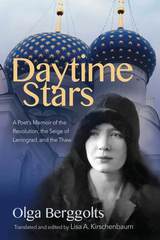
Berggolts wrote her memoir Daytime Stars in the spirit of the thaw after Stalin's death. In it, she celebrated the ideals of the revolution and the heroism of the Soviet people while also criticizing censorship of writers and recording her doubts and despair. This English translation by Lisa A. Kirschenbaum makes available a unique autobiographical work by an important author of the Soviet era. In her foreword, Katharine Hodgson comments on experiences of the Terror about which Berggolts was unable or unwilling to write.

Using a comparative case study method, Scott examines the historical, intellectual, and ideological origins of the Reagan Doctrine as it was applied to Afghanistan, Angola, Cambodia, Nicaragua, Mozambique, and Ethiopia. Scott draws on many previously unavailable government documents and a wide range of primary material to show both how this policy in particular, and American foreign policy in general, emerges from the complex, shifting interactions between the White House, Congress, bureaucratic agencies, and groups and individuals from the private sector.
In evaluating the origins and consequences of the Reagan Doctrine, Deciding to Intervene synthesizes the lessons that can be learned from the Reagan administration’s policy and places them within the broad perspective of foreign policy-making today. Scott’s measured treatment of this sensitive and important topic will be welcomed by scholars in policy studies, international affairs, political science, and history, as well as by any reader with an interest in the formation of American foreign policy.

The lively, engaging chapters of this book examine texts by contemporary women writers in the context of the political, social, economic, biological, psychological, and aesthetic transformations that helped define them. Goscilo reveals that the Russian cultural revolution has reshaped the female image in varied and often contradictory ways. While increased interaction with the West fostered gender awareness, it also introduced imported Western sexist practices--especially the exploitation of female bodies--formerly proscribed by a puritanical censorship. Popular magazines, newspapers, and television propagated the image of woman as mother, ornament, and sexual object, even as women's fiction conceived of womanhood in complex psychological terms that undermined the gender stereotypes which had ruled Soviet thinking for more than 70 years.
With the aid of feminist and cultural theory, Dehexing Sex investigates the overt and internalized misogyny that combined with the genuinely liberalizing forces unleashed by Gorbachev's policy of glasnost and perestroika. It exposes Russia's repressive romance with womanhood as a metaphor for nationhood and explores Russian women's ironic recasting of national mythologies.
"Impressive . . . an important contribution to Russian studies and to women's studies. The author is an outstanding scholar, an energetic and original thinker, and her writing sparkles with imagination and wit." --Stephanie Sandler, Amherst College
Helena Goscilo is Associate Professor and Chair of Slavic Languages and Literatures, University of Pittsburgh.

In his study of Brandenburg, Germany, Timothy Vogt directly challenges both the "antifascist" paradigm employed by East German historians and the "sovietization" interpretive model that has dominated western studies. He argues that Soviet denazification was neither an effective purge of society nor part of a methodical "sovietization" of the eastern zone. Instead, in a detailed study, denazification is pictured as a failure, which fell short of its goals and was eventually abandoned by the frustrated Soviet and German leadership.The case example of Brandenburg is an effective means of putting "flesh and blood" into the study and giving the reader insight into both broader developments and the human actors who propelled events. The result is an analysis that is based not simply on policymakers and their policies, but rather on how policy was continuously reformulated in response to developments on the local level.
The study encompasses significant aspects of contemporary European history: everyday life in Nazi Germany, Germany's postwar coming to terms with its Nazi past, the Cold War division of Germany, postwar Soviet policy, and the construction of a one-party communist system in Eastern Europe.
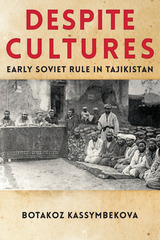
In a region marked by ethnic, linguistic, and cultural diversity, the Soviet plan was to recognize these differences while subsuming them within the conglomerate of official Soviet culture. As Kassymbekova reveals, the local ruling system was built upon an intricate network of individuals, whose stated loyalty to communism was monitored through a chain of command that stretched from Moscow through Tashkent to Dushanbe/Stalinabad. The system was tenuously based on individual leaders who struggled to decipher the language of Bolshevism and maintain power through violent repression.
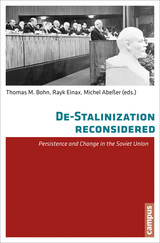
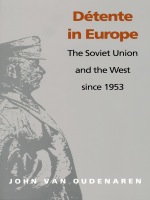
In redefining détente as a process, rather than a code of conduct, Van Oudenaren looks to its origins in Soviet policy earlier than previously identified and analyzes both its history and character. His study explores the restoration of four-power negotiations in Germany and Austria in the mid-1950s, their subsequent breakdown in the Berlin crisis, their unexpected revival in 1990 in the form of “two plus four” talks on German unity, and the future of the Soviet Union as a European power.
Among the key elements of détente discussed are diplomacy, particularly the role of summit conferences; cooperation among parliaments, political parties, and trade unions; arms control; economic relations; and links among cultural institutions, churches, and peace movements.
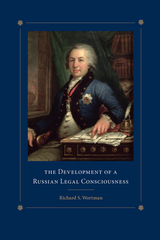

This unusual and provocative collection brings to light a dimension of Soviet history and policy rarely explored.


This collection includes Price’s pre-censored observations and comment, written for a range of British publications, as well as letters, postcards, and other writings. A foreword by Eric Hobsbawm and introductory material by Rose place Price’s observations in biographical and historical context. Dispatches from the Revolution offers an account of the Russian Revolution from an eyewitness whose political commitment, fluency in Russian, and extensive travel far beyond the cities permitted him to write, uniquely, not only of metropolitan news and politics, but also of the experiences and issues signficant to ordinary peasants, workers, and soldiers in remote areas of the Russian empire.
An important source to scholars of Russian history, this book will also appeal to general readers with interests in Russia, journalism, and world affairs.

In A Displaced Person—the third book in a trilogy that began with the modern classic The Life and Extraordinary Adventures of Private Ivan Chonkin and continued with Pretender to the Throne—author Vladimir Voinovich turns his satirical eye to the difficult last days of the Soviet Communism he so lampooned. Often absurd, A Displaced Person follows a series of random events that brings Chonkin to the United States, where he becomes a farmer and, eventually, a member of a congressional delegation sent to the Soviet Union in 1989, during perestroika, to discuss agriculture with the Soviet leader Mikhail Gorbachev. A Displaced Person carries on the rich Russian tradition of an essentially comic response to the absurdities inherent in totalitarian regimes.
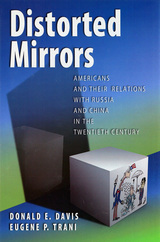

On January 13, 1953, the official press agency Tass announced the arrest of a group of "killer doctors" who were systematically doing away with prominent public figures in the Soviet Union. Nine doctors, six of them Jews, were cited, and in the next few weeks many more were carted off to the dread prisons of Lubyanka and Lefortovo. Among them was Yakov Lvovich Rapoport, a distinguished pathologist; this book is a firsthand memoir of his imprisonment, revealing not only the suffering caused by a fabricated "plot" but also the devastating climate of antisemitism and the appalling disarray of medicine and science in the Stalinist era.
Rapoport outlines the background of the infamous incident: arrests of prominent physicians had begun in 1952 and created hysteria throughout the country. Clinics were empty, patients refused professional medical advice, rumors abounded of poisoned medicines in pharmacies and murdered infants in maternity wards. Public opinion was primed to accept the Doctors' Plot, and to this day no one knows how many hundreds or thousands of doctors, prominent and ordinary, were victimized. Rapoport himself was arrested in early February, and he recalls in meticulous detail the psychological and physical pain he endured, all the while steadfastly denying that there was any conspiracy. He was saved from certain execution only by the death of Stalin.
The Doctors' Plot of 1953 is the gripping story of a brave man that gives a dismal picture of what life—especially for intellectuals and for Jews—was like in the Soviet Union under the paranoid Stalin. There is much information on the distortion of biology by Lysenko, the demagogic elevation of such charlatans as Olga Lepeshinskaya, the fictitious murder of Gorky and the quite likely murder of Frunze, and other mind-boggling examples of the surrealistic politics of Soviet science.
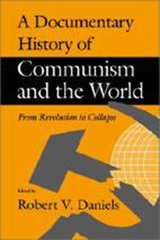
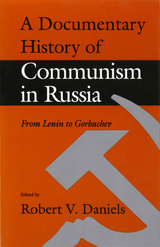

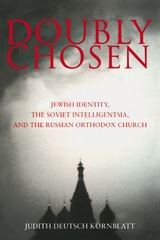
Doubly Chosen provides the first detailed study of a unique cultural and religious phenomenon in post-Stalinist Russia—the conversion of thousands of Russian Jewish intellectuals to Orthodox Christianity, first in the 1960s and later in the 1980s. These time periods correspond to the decades before and after the great exodus of Jews from the Soviet Union. Judith Deutsch Kornblatt contends that the choice of baptism into the Church was an act of moral courage in the face of Soviet persecution, motivated by solidarity with the values espoused by Russian Christian dissidents and intellectuals. Oddly, as Kornblatt shows, these converts to Russian Orthodoxy began to experience their Jewishness in a new and positive way.
Working primarily from oral interviews conducted in Russia, Israel, and the United States, Kornblatt underscores the conditions of Soviet life that spurred these conversions: the virtual elimination of Judaism as a viable, widely practiced religion; the transformation of Jews from a religious community to an ethnic one; a longing for spiritual values; the role of the Russian Orthodox Church as a symbol of Russian national culture; and the forging of a new Jewish identity within the context of the Soviet dissident movement.
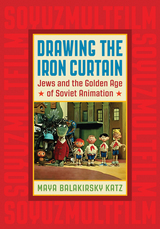
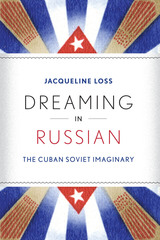
The specter of the Soviet Union lingers in Cuba, yet until now there has been no book-length work on the ways Cubans process their country’s relationship with the Soviet bloc. Dreaming in Russian at last brings into the light the reality that for nearly three decades, the Soviet Union subsidized the island economically, intervened in military matters, and exported distinct pedagogical and cultural models to Cuba. Drawing on interviews with Cuban artists and intellectuals, as well as treasures from cinematographic and bibliographic archives, Jacqueline Loss delivers the first book to show that Cuba remembers and retains many aspects of the Soviet era, far from shedding those cultural facets as relics of the Cold War.
Weaving together intriguing, seldom-seen images, Dreaming in Russian showcases the ways in which Cuba’s relationship to its Soviet benefactors lingered after the disintegration of the U.S.S.R. in 1991. Analyzing numerous literary texts and works of visual art, Loss also incorporates aspects of architecture, popular culture, the space race, and other strands to create a captivating new perspective on Cuban society. Among the luminaries featured are poet Reina María Rodríguez, writer Antonio José Ponte, visual artist Tonel, and novelist Wendy Guerra. A departure from traditional cultural history, Loss’s approach instead presents a kaleidoscopic series of facets, reflecting the hybrid nature of the self-images that emerged in the aftermath of the Soviet aegis. As speculations about Cuba’s future under Fidel Castro’s heir apparent continue, the portrait that emerges in Dreaming in Russian is both timely and mesmerizing.

The Dynamics of Soviet Politics is the result of reflective and thorough research into the centers of a system whose inner debates are not open to public discussion and review, a system which tolerates no public opposition parties, no prying congressional committees, and no investigative journalists to ferret out secrets. The expert authors offer an inside view of the workings of this closed system a view rarely found elsewhere in discussions of Soviet affairs. Their work, building as it does on the achievements of Soviet studies over the last thirty years, is firmly rooted in established knowledge and covers sufficient new ground to enable future studies of Soviet politics and social practices to move ahead unencumbered by stereotypes, sensationalism, or mystification.
Among the subjects included are: attitudes toward leadership and a general discussion of the uses of political history; the dramatic cycles of officially permitted dissent; the legitimacy of leadership within a system that has no constitutional provision for succession; the gradual adoption of Western-inspired administrative procedures and "systems management"; a study of group competition, and bureaucratic bargaining; Khrushchev's virgin-lands experiment and its subsequent retrenchment; the apolitical values of adolescents; the problems of integrating Central Asia into the Soviet system; a history of peaceful coexistence and its current importance in Soviet foreign policy priorities, and, finally, an overview of Soviet government as an extension of prerevolutionary oligarchy, with an emphasis on adaptation to political change.
READERS
Browse our collection.
PUBLISHERS
See BiblioVault's publisher services.
STUDENT SERVICES
Files for college accessibility offices.
UChicago Accessibility Resources
home | accessibility | search | about | contact us
BiblioVault ® 2001 - 2024
The University of Chicago Press









